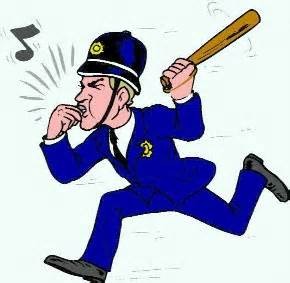I believe that the police in the episode of 24 hours in police custody showed great patience, especially when suspects were continually answering with “no comment” as this does not help their investigation. I can imagine this would also be extremely frustrating yet the police officers managed to stay extremely calm and collected which is a grea t professional attribute. There was a huge sense of cooperation between all departments of the police in organising arrests and interviews. Being a team member is very important in this profession as they are working against the clock and need to communicate and work together to make the most of their time. I believe the officers (particularly the female interviewer) showed compassion and respect to the suspect, especially when she said she was not here to judge. She also shows compassion for the families of suspects. All these officers are extremely determined to protect children. They are very knowledgeable about their career and also how criminals can think, but they also have knowledge on how their presence can impact children in the home which they are entering. I think this is extremely important and contributes to them being good professionals as they have knowledge beyond their profession.
t professional attribute. There was a huge sense of cooperation between all departments of the police in organising arrests and interviews. Being a team member is very important in this profession as they are working against the clock and need to communicate and work together to make the most of their time. I believe the officers (particularly the female interviewer) showed compassion and respect to the suspect, especially when she said she was not here to judge. She also shows compassion for the families of suspects. All these officers are extremely determined to protect children. They are very knowledgeable about their career and also how criminals can think, but they also have knowledge on how their presence can impact children in the home which they are entering. I think this is extremely important and contributes to them being good professionals as they have knowledge beyond their profession.
What points in the programme are the professional’s skills most noticeable?
I think the professional’s skills are most noticeable in interviews. They show huge amounts of patience and calmness throughout the long interview process. Th ey also listen carefully and don’t interrupt suspects when speaking. Another professional skill shown during the interview process is the respect they show the suspect. They allow them to discuss issues with their solicitor and give them the ability to not answer any questions they find inappropriate. The officers are very considerate when entering people’s homes as well and try to minimise the impact their presence will have on children, I feel this is a professional skill. When the suspect leaves the room the officers talk normally and joke, however at no point do they do this in front of the suspect which I feel is important in acting professionally.
ey also listen carefully and don’t interrupt suspects when speaking. Another professional skill shown during the interview process is the respect they show the suspect. They allow them to discuss issues with their solicitor and give them the ability to not answer any questions they find inappropriate. The officers are very considerate when entering people’s homes as well and try to minimise the impact their presence will have on children, I feel this is a professional skill. When the suspect leaves the room the officers talk normally and joke, however at no point do they do this in front of the suspect which I feel is important in acting professionally.
Are there any times in the programme where the professionals do not act professionally?
I didn’t feel there were many times the officers acted unprofessionally. However there was one incident were the female custody sergeant referred to a suspect as “what an idiot.” Although the suspect did not hear her, I think the comment is extremely inappropriate and unprofessional as she is casting judgement.
What is the impact of professional and (if you saw any) unprofessional behaviour on the people the midwife/barrister/police officer was working with?
I felt that the professional behaviour of the interviewing officers allowed the suspects to feel more relaxed and at ease. I think the fact they weren’t judging allowed one suspect in particular to be a lot more open about his crimes. I also feel that because they are listening and respecting the suspect, the suspect shows the same behaviour back and has a better interview process because he feels fairly treated. I didn’t notice any unprofessional behaviour which impacted the people the officers were working with, however this could’ve been a different story had a suspect heard the officer refer to him as an idiot.
What about dress code? Does it matter how the midwives/barristers/police officers dress and if so why?
I believe that the custody sergeant was dressed very smartly and this gave the impression that what was about to happen was very serious. However many of the police officers and interviewers were dressed very casually. I feel this gives the impression that the situation is very informal when in reality the people they are interviewing could be going to prison for a long time. I feel their dress code does not reflect the seriousness of the case. I believe that when entering people’s houses officers should be dressed in uniform so that the suspects can identify the potential seriousness of a situation. In my opinion entering a person’s house to investigate in a hoody looks very unprofessional.
Having watched the programme, if you were asked to develop a degree for student midwives/barristers/police officers what learning methods do you think would be most relevant? Try and ascribe a percentage of time the students might need to spend on the following learning methods and give a rationale for your percentage.
- Attending lectures – 20%
- Background reading about relevant subjects. – 35%
- Practical skills based training such as role play – 25%
- Work based learning – 30%
I found this really difficult to decide. I feel that attending lectures is extremely important in any degree. However I feel that the most important aspect in a degree for police officers could possible be the background reading. The police officers in this episode showed a huge amount of background knowledge and seemed to also have knowledge on other topic areas. I think role play is also an important aspect because some situations may get physical and can often be unpredictable so it is important to train students as best as possible in order for them to deal with any situation. I believe work based learning is of huge importance to any trainee. It allows them to observe and get a taste of their chosen profession. It also allows them to see different ways officers deal with situation. I think a hands on experience would be very beneficial in training any profession.

 ituation by taking the $50 and giving only $5 change. I can’t imagine doing this to someone who clearly can’t tell the difference and would have no clue that he had been robbed of $50. I found it interesting that both men so far have used the situation to their financial advantage and both women have pointed out the mans error and given him correct change.
ituation by taking the $50 and giving only $5 change. I can’t imagine doing this to someone who clearly can’t tell the difference and would have no clue that he had been robbed of $50. I found it interesting that both men so far have used the situation to their financial advantage and both women have pointed out the mans error and given him correct change. by watching till the end of the clip that perhaps someone would give the man change and not take the $5 or $50 note. I was totally shocked when one man took the $50 and swapped it for a lower valued note and had the nerve to pretend that he had returned the $50. I found it interesting that when questioned afterwards he acted as if he didn’t know and that he was sorry. However had this been a real life situation he would’ve walked off profiting from another person’s error.
by watching till the end of the clip that perhaps someone would give the man change and not take the $5 or $50 note. I was totally shocked when one man took the $50 and swapped it for a lower valued note and had the nerve to pretend that he had returned the $50. I found it interesting that when questioned afterwards he acted as if he didn’t know and that he was sorry. However had this been a real life situation he would’ve walked off profiting from another person’s error.
 ance of a task, etc. which is used as a basis for improvement
ance of a task, etc. which is used as a basis for improvement y knock their confidence but force them into a negative frame of mind in relation to learning. Their are multiple ways to give feedback such as 2 stars and a wish, stickers and reward charts. Although 2 stars and a wish can work positively in most situations, it is possible for some children to get fed up of constantly having an improvement and if their work is of high standards we shouldn’t force ourselves to find faults. I hope that when on placement I learn other effective feedback systems which I can use and develop in my teaching. I also hope that I can effectively use feedback I receive to improve my writing technique and teaching styles.
y knock their confidence but force them into a negative frame of mind in relation to learning. Their are multiple ways to give feedback such as 2 stars and a wish, stickers and reward charts. Although 2 stars and a wish can work positively in most situations, it is possible for some children to get fed up of constantly having an improvement and if their work is of high standards we shouldn’t force ourselves to find faults. I hope that when on placement I learn other effective feedback systems which I can use and develop in my teaching. I also hope that I can effectively use feedback I receive to improve my writing technique and teaching styles.



